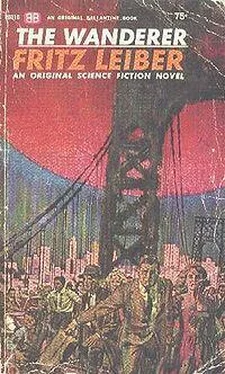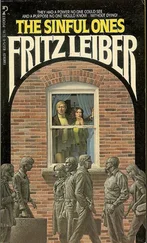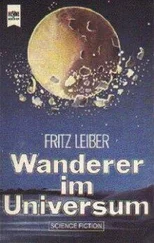The helicopter dipped violently. The wavelets cringed from its rotors, which almost touched them. The ladder fell away from the helicopter and floated on the wavelets like the skeleton of a giant centipede. The ’copter lifted and beat off north without another word.
Jake scrambled to his feet and watched its small lights grow tinier.
Sally came behind him. “Why’d you let go, Jake?” “I was afraid I’d crack my shins against the railing,” he told her self-disgustedly. “I couldn’t help it.” She clung to him.
As Hunter steered the Corvette slowly down the next to the last hill to the Coast Highway, the emerald sun setting on the watery horizon was still bright enough to show what looked like at least a mile of new beach stretching out beyond the old one to the edge of a calm sea. He grinned around at the others, his nerves untouched by the eeriness of their green-lit faces. He had a childish impulse to shout to Hixon in the truck just behind: “What’d I tell you? Dead low or near it! — I hit it on the nose!”
“Look, Mommy,” Ann said, “a vine growing across the road 1.”
It couldn’t be that, Hunter knew, but it was some sort of vegetable debris, perhaps a branch torn down and blown there by yesterday’s rainstorm. There was the faintest popping sound as the tires rolled across it. The car skidded a little, and he straightened it and decreased speed. He did this quite automatically since like the others his attention was preoccupied by the degree to which the sea had receded. A mile now seemed a gross underestimate. He was at first amazed, then fascinated, finally plain awestruck.
Going downhill made the sun set faster. The green light grew gloomy. Although the ocean was so far away, its reek was strong and fishy. There was no wind, and save for the chug of the two motors there was a general hush. No cars were passing along the Coast Highway, he remarked to himself — and only then realized that the stupid part of his mind had still been expecting them.
They started down the last hill. Again the car skidded a fraction, and this time Hunter shifted into low as he straightened.
“I don’t remember that ruined house,” Rama Joan said thoughtfully.
“And I don’t remember the old boat out in the field,” Margo chimed in from behind her.
There was a sudden squawking. “Look at those white birds pecking on the hillside,” Wanda observed shrilly. “Why, I do believe they’re gulls.”
“Here comes another vine,” Ann informed them. “No, two. Oh, and a fish.”
At that word a horror gripped Hunter and the scene around him turned nightmarish, though for the moment he didn’t quite know why — there was something dreadfully obvious his mind refused to see. Hixon was honking behind him. Did the fool want to pass? One — two — three — four. Four honks meant something, but he couldn’t remember what, because now he realized that the horror was the illusion that they were traveling under the sea — the silence, the gloomy green light, the black road changing by imperceptible degrees to a feather-smooth slope of silty slime, the fishy reek ("…and a fish!"), the seaweed bladders popping as they drifted across the two “vines"…
Four means stop, Doc had said. Instantly, but very gingerly, Hunter put on the brakes. At first the car hardly slowed at all. Then gradually it came to a halt, slewing around in spite of all his steering — came to a stop because its tires were pushing up ridges of silt from a smooth coating an inch or more thick on the road.
He looked back along the road, simply because the car was now facing almost backwards, and he saw the truck, green in the last of the sunlight, stopped, unslewed, fifty feet or so behind. His hands were shaking on the wheel, and his heart was pounding.
It was Rama Joan who put the dreadfully obvious into words. She said, rather casually: “We must have passed the highwater mark a quarter of a mile back.”
That was what was jolting his muscles and drumming his heart, Hunter realized — and as he realized it, his body began to quiet — simply the thought of the salt water that had been everywhere here and dozens of feet overhead, only six hours ago, leaving behind its sea-life and its sea-earth and its wreckage, the salt water that would be here again six hours from now — the thought of the tides of a few feet now sinking at low beneath the continental shelves and rushing back at high over the foothills of mountains.
The women were taking it with an incomprehensible calm, he thought. It would have seemed more natural if they’d been screaming.
Hixon and Doddsy and Wojtowicz and McHeath were coming down to them from the truck. They were walking oddly — stiff-legged and with elbows out. But, of course — the mud-coated road would be very slippery.
Hixon and Doddsy stepped beside him, while the others walked on. The Little Man said, looking out to sea: “It’s…” and then words evidently failed him.
The last sliver of green sun went under, but the whole sky stayed green — pale as a transparent wave to the west, dark as a forest to the east.
There was a rhythmic throbbing. Hunter realized that the engine of the Corvette was still turning over. He twisted the ignition key.
Only then did he realize that everyone else must be as stunned as he was.
A couple of minutes later they were all pulling out of their shock. Most of them had got out of the cars and were standing gingerly in the muck.
Wojtowicz and McHeath came trudging back uphill. The latter’s pants were covered with mud and his shoes were big blobs of it. “You can’t take a car that way, Mr. Hunter,” he said cheerfully. “It gets feet deep on the highway.”
Wojtowicz nodded emphatically. “The kid went further than I did,” he averred. “Just look at him.”
“And all deposited in only three high tides,” the Little Man said, shaking his head. “Amazing.”
Hunter said bitterly: “There’s nothing else for it — we’re going to have to go back and take that other road with the sign saying it led to Vandenberg.” He looked at Hixon. “You were right.”
Hixon nodded. He surveyed the Corvette’s mired wheels. “I guess I can pull you out of this,” he said. “I got a towline, and where I’m stopped the mud’s a lot thinner and almost dry. I should have good enough traction. And I got chains if I need ’em.”
“I don’t want to be a bird of ill omen,” the Little Man said, “but when we go back there’s the danger of running into those young goons from the Valley.”
Hixon shrugged. “That’s one of the chances we got to take. There’s no other road. We’ll hope Ross’s roadblock held ’em and they headed for Malibu. I’ll get the towline.”
Margo said to Hunter, “It’s only four miles to Vandenberg. Couldn’t we walk it? Even with the mud it shouldn’t take more than a few hours.”
Hunter said to her in a harsh whisper: “Use your head. In less than a few hours the coast road will be under water. Even this spot’ll be fifty or more feet deep.”
“Oh, I’m getting stupid,” Margo sighed wearily. “I wish…” She didn’t say what.
He inquired, rather bitterly: “Isn’t living by yourself in the new reality so much fun any more?”
She looked up at him. “No, Ross,” she said, “it’s not.”
The Little Man interrupted: “And when it comes to walking, we’ve got to remember we’ve got Ray Hanks to carry. I don’t like his condition, Ross. I’ve given him all the barbiturates I think I should. He fell asleep as soon as the truck stopped, but he’ll probably wake when it starts again. He’s in a lot of pain.”
Just then Pop came limping up. “Mr. Hunter,” he said, “I can’t stand riding the back of that truck any more. I’m all bent up.”
Читать дальше










